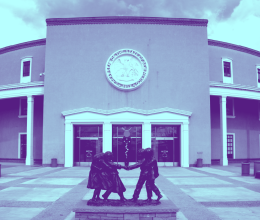EL PASO — In September 2017, the ACLU’s Regional Center for Border Rights (RCBR) will begin relocation of its primary base of operations 46 miles to the south in El Paso, while maintaining a smaller presence in Las Cruces to continue providing services throughout southern New Mexico.
Founded with a mission of holding federal border authorities accountable to human and civil rights laws, the RCBR has supported border communities for over ten years by providing “Know Your Rights” education, documenting government misconduct, and advocating for reforms that protect human life and dignity. The office is a collaboration of the ACLU affiliate offices in New Mexico, Texas, Arizona and San Diego, CA.
“The ACLU has long been active in El Paso but has not had permanent staff in the city. That will change when the RCBR moves its primary base of operations from Las Cruces to El Paso this fall,” said Terri Burke, executive director of the ACLU of Texas. “Over the past decade, the RCBR has established a strong and influential presence in southern New Mexico that will continue. The move to a major metropolitan home base like El Paso will allow us to expand that presence and influence to better protect the civil rights and liberties of border residents. Anti-immigrant rhetoric, racial profiling, and raids are all on the rise in our border communities, and we'll now have boots on the ground ready to respond to the constitutional abuses they inevitably provoke.”
The ACLU of New Mexico founded the Regional Center for Border Rights in 2006 in anticipation of growing civil rights conflicts along the U.S.-Mexico border. Since that time, the RCBR achieved:
o The public release of a reformed U.S. Customs and Border Protection (CBP) use-of-force manual that drew upon ACLU and peer law enforcement recommendations regarding scenario-based training and de-escalation techniques.
o Reforms of CBP’s internal affairs investigations that increase transparency through public reporting of use of force investigation outcomes.
o Implementation of the first-ever standards governing border agents’ treatment of individuals in short-term custody, referred to as the Transport, Escort, Detention and Search standards (“TEDS”).
o Revised repatriation agreements between Mexico and the United States that, for the first time, require the Department of Homeland Security (DHS) to take all feasible steps to return personal belongings to deported immigrants during repatriation.
RCBR staff regularly briefs U.S. congressional staff on the impacts of federal border immigration policies and testifies before international human rights bodies in Geneva, including the High Commissioner for Human Rights.
Peter Simonson, executive director of the ACLU of New Mexico, said, “By strengthening the RCBR’s presence in El Paso, we hope the office will be able to expand its impact and claim a higher profile in the national debate to hold border agents accountable. El Paso is an epicenter of border enforcement activity and all the civil and human rights problems that come with it. The RCBR’s move comes at an opportune time given the new administration’s threats to build a border wall and dramatically expand staffing for border enforcement agencies that are already vastly over-resourced, heavily armed and poorly trained.”
Simonson said that the RCBR will continue many of its initiatives in southern New Mexico. The ACLU of New Mexico is currently exploring plans to open a smaller office in Las Cruces once the RCBR’s transition to El Paso is completed at the end of 2017.
###




